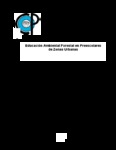Educación Ambiental Forestal en Preescolares de Zonas Urbanas
Abstract
Hoy en día la educación juega un papel fundamental en el buen manejo
y conservación de los ecosistemas forestales. La implementación de una
estrategia educativa en éste ámbito se ha convertido en una necesidad
prioritaria. Para alcanzar una estrategia educativa exitosa se debe de
contemplar sin lugar a dudas a los niños de edad preescolar, pues es a esa
edad en que los niños forjan sus hábitos.
El presente estudio evalúa el impacto que tiene la aplicación de técnicas
y herramientas pedagógicas basadas en el “aprendizaje significativo”. Se
trabajó con dos poblaciones de niños en edad preescolar provenientes de dos
jardines de niños. Dichas poblaciones se dividieron a su vez en dos
subpoblaciones, la primera conformada por los niños que recibieron educación
ambiental forestal (EAF) y la segunda consistente de los niños que no
recibieron EAF.
Se trabajó con un total de 124 niños. El estudio se desarrolló en tres
etapas: diagnóstico, propuesta y evaluación. Un análisis ANOVA realizado
durante la etapa de diagnóstico demostró que no existía diferencia significativa
entre las subpoblaciones en cuanto al nivel de conocimientos relacionados a la
EAF previos a la implementación de la propuesta. Posterior al diagnóstico se
implementó la propuesta consistente en técnicas y herramientas pedagógicas
que favorecen la EAF. Finalmente se llegó a la etapa de evaluación y otro
ANOVA confirmó que si existían diferencias estadísticamente significativas
entre el nivel de conocimientos relacionados con la EAF entre los niños de las
subpoblaciones.
Lo anterior permite concluir que la aplicación de herramientas y técnicas
pedagógicas con contenidos dirigidos a la obtención de una EAF influye
positivamente en el nivel de conocimientos que los niños logran hacer
significativos. Lo anterior resulta en niños más comprometidos con el cuidado
del medio ambiente en general y de los bosques en lo particular._________The education plays a key role in the proper management and
conservation of forest ecosystems in our days. The implementation of an
educational strategy in this area has become a high priority need. To achieve a
successful educational strategy we must contemplate certainly the
preschoolers; since it is in that age when children shape their habits.
This study evaluates the impact of the application of techniques and
teaching tools based on "meaningful learning". We worked with two groups of
preschool children from two kindergartens. These populations were divided into
two subgroups, the first one consisting of children who received environmental
education forestry (EEF) and the second one consisting of children who
received no EEF.
We worked with a total of 124 children. The study was conducted in three
stages: diagnosis, proposal and evaluation. An ANOVA analysis performed
during the diagnosis phase showed no significant difference among subgroups
in the level of knowledge related to the EEF prior to the implementation of the
proposal. After the diagnosis phase, a proposal with technical and pedagogical
tools that promote the EEF was implemented. Finally we reached the evaluation
phase and another ANOVA confirmed that actually there are statistical
differences among subgroups in the level of knowledge related to EEF.
This suggests that the application of tools and teaching techniques with
content aimed at obtaining an EEF positively affect the level of knowledge that
children are able to make significant. This leads children more committed to
caring for the environment in general and forests in particular.
Collections
- Tesis MC, MT, MP y DC [289]

